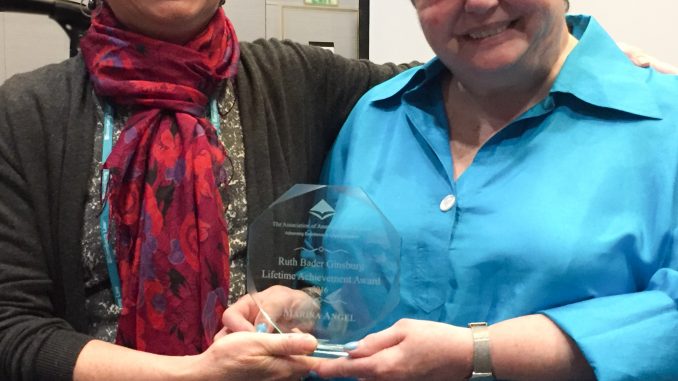
As a 20-year-old student at Columbia University Law School in the mid-1960s, Marina Angel stood in the office of Columbia’s Dean of Admissions and demanded the recognition of her female peers.
Angel said she saw that women at Columbia University were graduating with less recognition than men despite the fact that they had similar, if not better grades.
More than 50 years later, Angel continues to defend equal rights as a professor in the Beasley School of Law. After working for 39 years at the university, she is set to retire in June 2017.
During her career, she researched and published more than 40 papers regarding women’s rights and the status of women in the law, some of which have been recognized and presented by the American Bar Association.
“I have always fought against the injustice I see around me,” Angel said.
Earlier this month, Angel received the Ruth Bader Ginsburg Lifetime Achievement Award — an honor that recognizes an individual who has had a distinguished career in teaching, service and scholarship for at least 20 years — at the Association of American Law Schools 111th Annual Convention in San Francisco.
Angel is a friend of Ginsburg, and they were two of the few women who were law professors in New York City during the 1970s.

Angel said she assumed a role as a “troublemaker” early in her career by shining a light on situations of which people were otherwise unaware.
She said one of her research papers studied 200 Pennsylvania law firms and concluded that few women become an equity partner at their firm. In a separate study regarding women in legal education, Angel found it was becoming more difficult for women to reach tenure, she said.
“Professor Angel has spent her career criticizing discrimination against women,” Provost JoAnne Epps said.
Epps has known Angel since 1985 as a colleague at the Beasley School of Law.
Epps has also worked with Angel at the professor’s annual Feminist Law Professor conferences. These conferences are held at different universities throughout Pennsylvania and address issues that women face in the legal environment.
“There are many women who feel their careers were made possible because of Professor Angel’s encouragement either directly to them or on behalf of societal change from which they benefitted,” Epps said.
During the 1990s, Angel also helped draft a law for the Temple Faculty Senate called “No Sexual Harassment, No Sexual Assault,” which addressed a scandal at Temple where certain male professors were acting inappropriately toward female students, she said.
“A lot of my work has been to shockingly point out the facts,” Angel said.
But before pointing out the facts in these publications, Angel had a successful two-year career as a lawyer at Gordon & Shectman, P.C., in New York during the mid-1970s.
She worked in many cases for equality, but was looking for a more effective way to make others more aware of injustice. She said she remembered the way professors at Columbia Law School connected with students, and decided to join the school’s faculty in 1979.
“I felt like I could make more of an impact through my writing and research,” Angel said. “I teach an enormous amount of people and I’d like to deliver to them an important message.”
The lifetime achievement award adds to a list of awards she won last year that have been presented to her by organizations like the Philadelphia and Pennsylvania bar associations.
“It’s validating to receive these awards,” Angel said. “It’s not always the best being the troublemaker because people don’t want to hear about the problems.”
On Feb. 22, Angel will receive another award: the Penn State Dickinson Law School’s Rambo Award, which recognizes leaders in education.
As she reflects on her career, Angel said she didn’t intentionally focus on women’s rights, but rather those who were affected by the injustice she saw.
“I have always been able to recognize what is wrong,” Angel said. “And I have always been able to fight against it.”
Patrick Bilow can be reached at patrick.bilow@temple.edu.


Be the first to comment